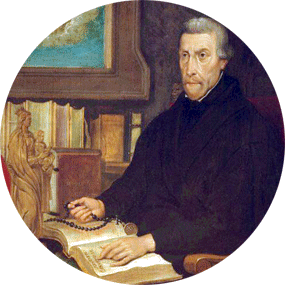
21 December
Memorial
St. Peter Canisius (1521-1597)
Priest and Doctor of the Church
Patron: Germany; Catholic press; catechism writers.
“If you have too much to do, with God’s help you will find time to do it all.”
St. Peter Canisius (1521-1597) was born at Nijmegen, Holland, at the very time that Luther began to rebel against the Church and St. Ignatius Loyola was laying the foundations of the Jesuit Order. After studying the arts, civil law and theology, St. Peter joined the Jesuit Order and was ordained a priest in 1546. He is noted especially for the following services to the Church: he defended the Catholic faith against the Protestants; by preaching, writing, founding colleges and seminaries, he caused Catholic life to flourish; he rendered invaluable services to the ecumenical Council of Trent; he wrote many Catechisms which were translated into twelve languages in his own life time. He died in Fribourg, Switzerland.
COLLECT PRAYER
O God, who for the defense of the Catholic faith made the Priest Saint Peter Canisius strong in virtue and in learning, grant, through his intercession, that those who seek the truth may joyfully find you, their God, and that your faithful people may persevere in confessing you. Through our Lord Jesus Christ, your Son, who lives and reigns with you in the unity of the Holy Spirit, God, for ever and ever.
Things to Do:
- See Celebrating the Feast of St. Peter Canisius and Celebrating the Feast of St. Thomas the Apostle (Extraordinary Form of the Roman Rite) for ideas.
St. Peter Canisius
Peter Canisius, the remarkable Jesuit who almost single-handedly re-evangelized Central Europe, founded dozens of colleges, contributed to the rebirth of Catholicism by his prodigious writings, and laid the groundwork for the Catholic Reformation north of the Alps. He was born at Nijmegen, Holland, in 1521, and his father was an instructor to princes in the court of the duke of Lorraine. St. Peter Canisius was part of a movement for religious reform as a very young man and in 1543, after attending a retreat given by Blessed Peter Favre, joined the Jesuits and was the eighth professed member of the Society of Jesus.
He worked first in the city of Cologne, becoming a spokesman for the Catholic party. He became a consultor to the cardinal of Augsburg at the Council of Trent and in 1547 was called by St. Ignatius to Rome. He was sent to Sicily to teach, then, after his solemn profession in Rome, was sent back to Germany as the first superior of the German province of the Jesuits.
Peter next began to restore and found colleges, first in Vienna and Prague, and then in Munich, Innsbruck, and throughout northern Germany. He attracted vocations to the Jesuits, and the society began to flourish in Central Europe. He organized the Jesuits into a compact unit and made the society a leading force in the Counter-Reformation. He was in contact with all the Catholic leaders in Germany, and wrote fourteen hundred letters giving support to those laboring for reform. He was the adviser of the emperor and the confidante of three popes. He was consulted by papal legates and nunciatures and was a severe critic of religious and clerical life in post-Reformation Germany.
He recommended far-reaching reforms and had a profound effect upon the education and spiritual life of the clergy. Through his efforts, seminaries were founded, and the popes sent him on important diplomatic missions. In the midst of his many labors, he edited and published editions of the Fathers of the Church, catechisms, spiritual manuals, and textbooks that went into countless editions even in his own lifetime.
He died on December 21, 1597, at Fribourg, Switzerland, and was canonized and declared a Doctor of the Church in 1925.
Source: Catholic Culture